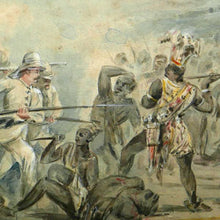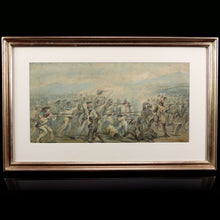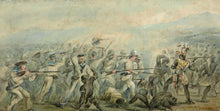‘Defeat of the Ashantees – Colonel Festing at Dunquah’, 1873
Adding product to your cart
Overall: 35cm (13.5in) x 56cm (22in)
Watercolour and pencil on paper. Colonel Festing centre right taking on an Ashanti in a depiction of the action at Dunquah, Ghana. Titled upper left. Sheet: 21.5 (8.5in) x 42cm (16.5in). Framed and glazed.
Based on a coloured lithograph of 1825 depicting Marines and Bluejackets in action against the Ashanti, the present watercolour commemorates Colonel Francis Festings’ part in the action at Dunkwa on 27 October 1873. Here Festing made a heroic attempt to recover the body of Lieutenant Eardley Wilmot RA who was shot down by the Ashanti whilst cheering on his men (the Houssa Artillery). Under heavy fire, Colonel Festing dashed forward, carrying a stout blackthorn for the purpose of 'encouraging' the men, who in Eardley Wilmot’s case had fled, and lifted Wilmot into his arms and bore him to safety, sustaining a severe wound in the hip.
Read more
Hitherto Festing had been called on to thwart an invasion of the informal British protectorate over parts of the Gold Coast at Elmina on 13 June 1873 as panic gripped the authorities at Cape Coast Castle. Festing commanded the forces in the two engagements fought on that day, when the Ashanti were defeated and their town burnt. On the arrival of Sir Garnet Wolseley, Festing was placed in command at Cape Coast, and charged with the measures for the defence of the place. He was taken on Wolseley's list of special service officers on 20 October, and took the command of the camp at Dunquah and of the advanced posts.
Major-General Sir Francis Worgan Festing KCMG, CB (1833-1886) was commissioned into the Royal Marines in 1854. He served in the Baltic during the Crimean War and commanded a mortar in the flotilla employed against Sebastopol. He served in the China Expedition of 1857–59 and took part in the bombardment and storming of Canton. In January 1865 he rescued three men from a wrecked vessel on Hayling Island and was awarded the RNLI's silver medal for Gallantry. He afterwards held a dormant commission to administer the government of the Gold Coast while commanding the regular troops, and was of the executive council. He was subsequently , knighted and received the thanks of both Houses of Parliament in March 1874.






